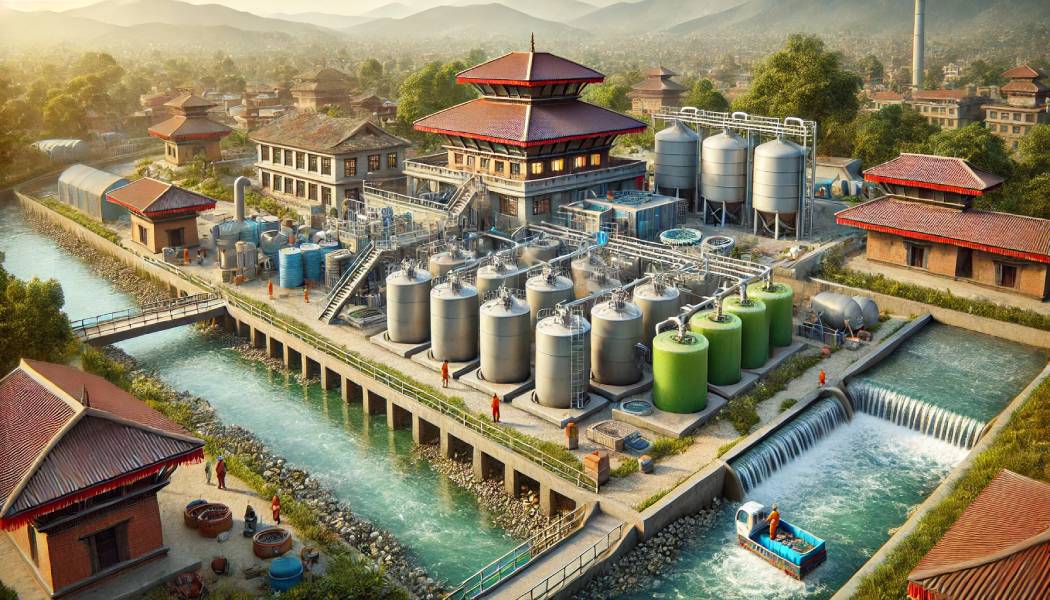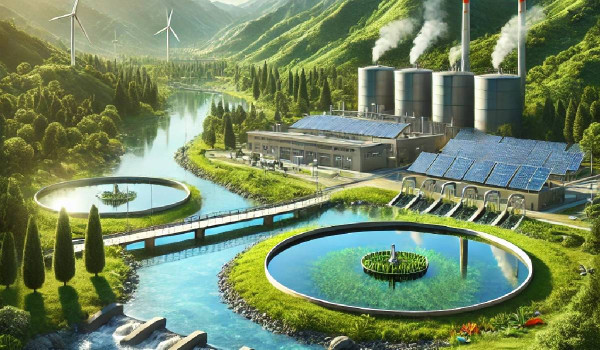News & Blogs
Optimizing Wastewater Management for Industrial Sustainability

Introduction
Effective wastewater management is a cornerstone of sustainable industrial operations. With over 2.3 billion people affected by global water scarcity and industries accounting for 22% of global water consumption (World Bank), optimizing wastewater treatment is an urgent necessity. Industrial sectors in Nepal and across the globe must implement advanced wastewater treatment solutions to mitigate environmental harm, reduce operational costs, and comply with global sustainability objectives such as the United Nations Sustainable Development Goal 6 (Clean Water and Sanitation).
This article explores innovative strategies industries can adopt to enhance wastewater management, including technology-driven solutions, regulatory compliance, and sustainable operational practices.
The Critical Need for Sustainable Wastewater Management
Key Facts & Industry Impact:
- Over 80% of global wastewater is discharged untreated into ecosystems, contaminating water sources such as rivers, lakes, and oceans (UNESCO).
- By 2030, water scarcity could displace 700 million people and impose an estimated $425 billion in annual costs on industries (World Resources Institute).
- The global wastewater treatment market is projected to expand at a 7% CAGR, reaching $462 billion by 2030 (Grand View Research).
Sectors such as textiles, agriculture, food processing, and manufacturing are among the largest contributors to industrial wastewater pollution. However, through strategic interventions, industries can become leaders in sustainable wastewater management.
Five Effective Strategies for Industrial Wastewater Management
1. Adoption of Advanced Treatment Technologies
Modern treatment solutions such as Membrane Bioreactors (MBR), Reverse Osmosis (RO), and Electrocoagulation can eliminate up to 99% of contaminants, including heavy metals and organic pollutants.
Case Study: A textile manufacturing unit in India successfully reduced its wastewater pollution by 90% after integrating MBR technology (World Bank Report).
Key Insight: Reverse Osmosis (RO) systems can recover 75-90% of wastewater, significantly decreasing reliance on freshwater resources.
2. Recycling and Reuse of Wastewater
Reusing treated wastewater for cooling systems, irrigation, and industrial processes can result in substantial cost savings.
- The food and beverage industry currently achieves only 30-40% water reuse efficiency, but through closed-loop systems, this rate can reach 80% (EPA).
- Coca-Cola has successfully replenished 100% of the water used in its beverages through robust wastewater recycling initiatives.
3. Zero Liquid Discharge (ZLD) Implementation
Zero Liquid Discharge (ZLD) systems recover 95% of wastewater as reusable water and solid byproducts such as salts. Despite being energy-intensive, ZLD adoption is increasing at a 12.3% CAGR (MarketsandMarkets).
Case Study: A chemical plant in Gujarat, India, achieved a 60% reduction in freshwater intake by implementing ZLD technology.
4. Smart Monitoring and IoT-Based Wastewater Management
IoT sensors and AI-driven analytics enable real-time monitoring of key parameters such as pH, turbidity, and chemical composition to optimize wastewater treatment processes.
- Predictive maintenance powered by IoT has been shown to reduce treatment costs by 20-30% (McKinsey).
- Singapore’s PUB Water Agency utilizes AI-driven wastewater prediction systems with an accuracy rate of 98%.
5. Strengthening Public-Private Partnerships (PPPs)
Collaborating with governments and local communities is vital for effective wastewater management.
- Fact: Industries in Vietnam reduced wastewater pollution by 50% after partnering with the government for the development of industrial treatment plants (Asian Development Bank).
- Case Study: A Biratnagar-based brewery in Nepal collaborated with CivilTech to establish a biogas-integrated wastewater treatment facility, cutting Chemical Oxygen Demand (COD) by 85% while generating clean energy.
Regulatory Compliance and Workforce Training in Wastewater Management
Key Regulatory Frameworks:
- In the United States, industries face fines exceeding $50,000 per violation for non-compliance with wastewater regulations (EPA).
- Nepal’s Environmental Protection Act (2019) mandates industries to treat wastewater before discharge, ensuring environmental safety.
Workforce Training & Best Practices:
- 40% of wastewater-related incidents are caused by untrained personnel (WHO).
- Regular training workshops improve operational efficiency and ensure compliance with safety standards.
Emerging Trends in Wastewater Management
Green Infrastructure & Natural Treatment Methods
- Constructed wetlands and biofiltration systems can lower wastewater treatment costs by 25-30% while providing environmental benefits (World Bank).
Circular Economy Approaches
- Leading corporations such as PepsiCo are closing the resource loop by treating wastewater for agricultural irrigation, reducing overall water consumption.
Decentralized Wastewater Treatment
- Compact, modular treatment plants offer a scalable and cost-effective solution for wastewater management in remote industrial zones across Nepal and beyond.
Conclusion
Industrial wastewater management is essential for sustainability, regulatory compliance, and cost savings. By leveraging advanced treatment technologies, recycling wastewater, implementing Zero Liquid Discharge systems, utilizing IoT solutions, and fostering public-private partnerships, industries can significantly reduce their environmental footprint.
At CivilTech, we specialize in customized wastewater treatment solutions tailored to industrial needs in Nepal and across international markets. Our expertise in sustainable wastewater management ensures compliance, efficiency, and long-term cost reductions.


-1742900752.jpg)
